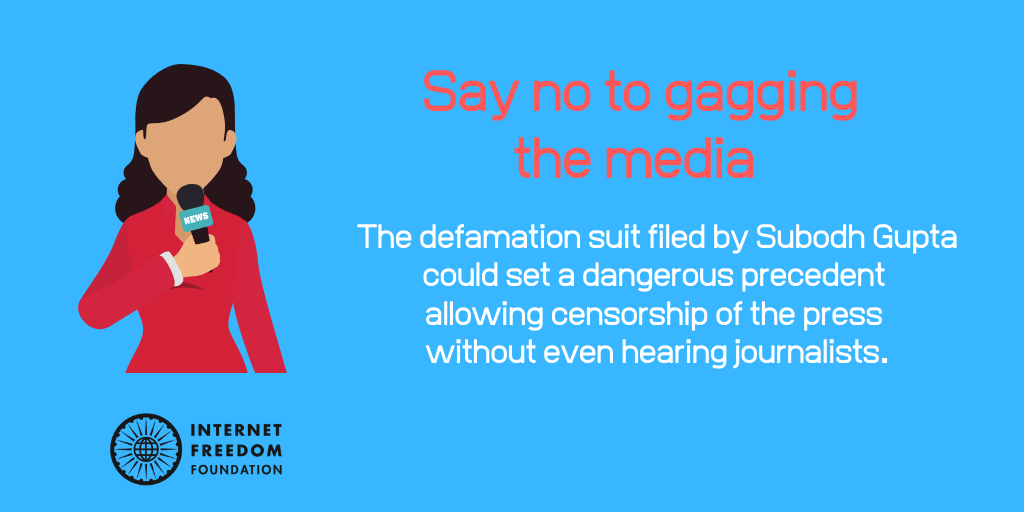
Tl;dr
On 22 January 2020, Justice Rajiv Sahai Endlaw of the Delhi High Court heard arguments by the Indian Journalists Union (IJU) and the Culture Workers Support Trust regarding their impleadment in the defamation suit filed by influential artist, Subodh Gupta seeking removal of Instagram posts and news reports containing anonymous allegations of sexual harassment against him. Read more about the case here. Senior Advocate, Ritin Rai and Advocate, Shreya Munoth appearing for IJU emphasized that news reports cannot be de-indexed without providing journalists an opportunity to defend their reportage. They further submitted there was a distinction between merely republishing defamatory allegations and reporting on them. They also highlighted the harm caused by de-indexing of news reports from Google search engine results by comparing it to removal of a book from the shelves of booksellers.
Private lawsuits also affect press freedom
At the beginning of the hearing, Endlaw J. noted that this was not a Public Interest Litigation and asked the counsels for IJU why they should be impleaded in a private defamation suit. In response, the counsels explained that private defamation suits can also violate the media's freedom of speech and expression under Article 19(1)(a) and journalists’ right to carry on their profession under Article 19(1)(g). In support of this proposition, the counsels cited a recent decision of the German Constitutional Court where it was held that prior to directing de-indexing of any online content from search engine results, courts must consider the impact of such de-indexing on the freedom of speech and expression of the publisher even in disputes under private law.
Is being de-indexed from Google really that big a deal?
During the previous hearing, the Court had passed an interim injunction and directed Google to de-index URLs hosting defamatory content against the plaintiff from its search engine results. Since this was the scope of the interim relief granted, Endlaw J. asked the counsels whether de-indexing from Google search engine results is a problem if the articles are still available on the website of the news publication. In response to this, the counsels explained that Google was the most commonly used search engine and removal from its search results would make it very difficult for individuals to access the news reports. To highlight the importance of search engines, the counsels compared removing a news article from Google search results to removing a book from the shelves of booksellers.
Reportage =/= republication
A large part of the hearing was devoted to discussing whether the press can have a better right than the person running the HerdandScene Instagram account to publish allegations against the plaintiff. Endlaw J. quizzed the counsels on whether republication of allegations which have been found to be prima facie defamatory by journalists is permissible. The counsels appearing for IJU clarified that there was a distinction between merely republishing allegations and reporting on them. They submitted that journalists have qualified privilege to report on the existence of allegations even if the allegation itself is unverified.
Of “errors” and their inevitability
The counsels for IJU drew the Court’s attention to various news articles whose removal has been sought by Subodh Gupta that either don’t refer to him at all or only reference his case briefly while making a broader point. To illustrate the problem, Mr. Rai cited this article by FirstPost about the Kochi Biennale dropping its inquiry into sexual harassment charges agains another artist, Riyaz Komu which was included in the list of defamatory articles submitted by Subodh Gupta. However, a bare perusal of the article reveals that the article doesn’t refer to Subodh Gupta at all. Subodh Gupta’s lawyers argued that this was an error but such overbroad and unnecessary censorship is inevitable because Subodh Gupta has not impleaded any of the media houses or journalists who could have defended the news reports and provided a counter viewpoint to the Court.
Need for anonymity in the art industry
Senior Advocate, Jayna Kothari appeared on behalf of the Culture Workers Support Trust and argued in favour of the Trust’s impleadment since the defamation suit raised important questions of law about non-availability of formal greivance redressal mechanisms within the art world and the need to preserve anonymity in cases of sexual harassment where there is possibility of retaliation.
The plaintiff’s stance
Senior Advocate, Sandeep Sethi appearing for Subodh Gupta stated that the Sexual Harassment of Women at Workplace (Prevention, Prohibition and Redressal) Act, 2013 imposes bar on media reporting and argued that if journalists are not allowed to write about sexual harassment allegations even when a formal complaint is made, how can journalists be allowed to write about anonymous allegations made on social media. He insisted that his client’s right to due process, privacy and reputation had been seriously prejudiced by anonymous defamatory allegations. He stated that the content of the news reports was defamatory on the face of it, and even the journalists who had written these articles could not oppose their de-indexing because they had not complied with norms laid down by the Press Council of India.
The next date of hearing in the case is 4 February 2020 and the counsels for IJU and Culture Workers Support Trust will make their rejoinder arguments then.
